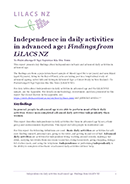This report presents findings from the Life and Living in Advanced Age Cohort Study (LiLACS NZ) about the activities that people can perform independently or without assistance, for Māori (aged 80–90 years) and non-Māori (aged 85 years).

Independence in daily activities in advanced age: Findings from LiLACS NZ presents findings about the activities that people can perform independently or without assistance, for Māori (aged 80–90 years) and non-Māori (aged 85 years).
The findings are from a population-based sample of people in advanced age living in the Bay of Plenty, who are taking part in a longitudinal study of advanced ageing, called Life and Living in Advanced Age: a Cohort Study in New Zealand – Te Puāwaitanga O Ngā Tapuwae Kia Ora Tonu (LiLACS NZ).
Overview of key findings
- Most people in advanced age (95 percent) could perform basic daily activities such as feeding oneself and personal care, independently.
- Almost 70 percent of people in advanced age could perform advanced activities such as housework and washing clothes, independently.
- Women were more likely than men to perform advanced activities independently.
This information will assist the health sector, especially health policy analysts, planners and health care providers from district health boards, primary health organisations and Māori health providers to plan and deliver effective services to people in advanced age.
For more information
Further information about findings in this report and LiLACS NZ are on the LiLACS NZ website.
